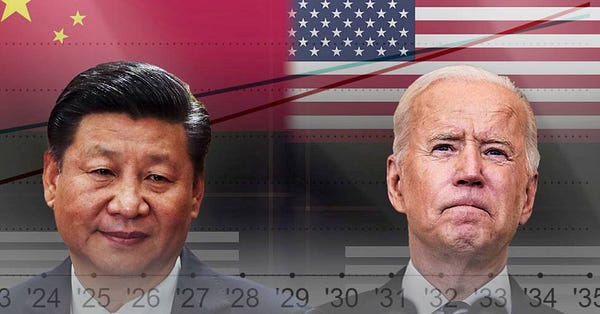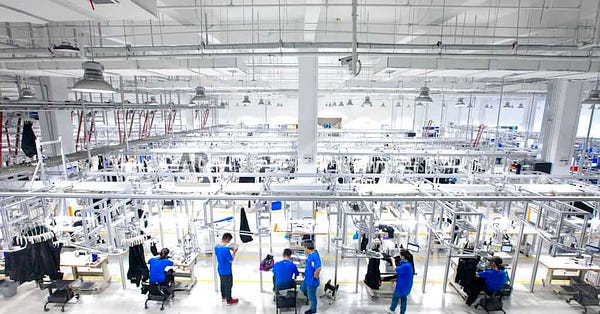Welcome to the 97th edition of Trade War.
As we near our 100th edition some changes are afoot for Trade War; more on that coming next year. Also, our publication will take a brief festive hiatus with plans to resume on January 15, 2022. For now, have a wonderful holiday and happy New Year.
***
A survey of economists says China’s politics and job situation require a ceiling of five percent GDP growth next year. And a Japanese think tank says China’s economy won’t become the world’s largest until 2033.
The U.S. Senate passes the Uyghur Forced Labor Prevention Act and approves Nicholas Burns as the next ambassador to China.
China pressures German firms to cut Lithuania out of their supply chains. An investigation by Reuters lays out a decade-long effort by online retailer Amazon to curry favor in China. And accounting firm KPMG pressures its Hong Kong employees to vote in what many view as a sham election.
Politics and jobs need 5+% growth
A survey of economists expects Beijing to set a floor of 5 percent growth next year, reports Bloomberg News’ Tom Hancock. This follows last week’s plus five percent projection by think tank CASS (see Trade War 96.)
“The target would represent a sizable drop from pre-pandemic growth rates that were closer to 7%, and reflect expectations that Beijing will persist with its efforts to reduce its reliance on real estate even at the cost of slower growth,” writes Hancock.
The need to ensure stable employment requires a growth rate above 5 percent, according to a recent report by Goldman Sachs. “Significant labor market pressure would build if growth slows further and persistently,” Goldman economists wrote.
Relatively strong growth is also very important as Beijing prepares for a once-every-five-years Party Congress which is expected to see Xi Jinping stay on for an unprecedented third term.
“Economic growth helps burnish Xi’s credentials as a competent leader as he tries to influence the transition,” reports the financial news service. “Past experiences suggest that Beijing would strive to beat the growth target in a year of political reshuffle,” wrote Morgan Stanley in a report.
“The Communist Party has vowed to double the size of the economy from 2020 levels by 2035, and views achieving the goal as key to maintaining legitimacy with the public. Meeting that requires an average annual growth rate of around 4.7% over the whole period,” the financial news service writes.

Evergrande and China’s real estate addiction
Here’s a deep dive into the economic fallout of the ongoing Evergrande crackdown and the rock-and-a-hard place dilemma real estate poses for China, in this podcast I did with PUSHBACK Talks’ former UN Special Rapporteur Leilani Farha and Swedish documentary filmmaker Fredrik Gertten.


China GDP to overtake US? Not until 2033
China’s GDP will likely not surpass the U.S. economy until 2033, a Japanese think tank predicts, reports Nikkei Asia.
While a year ago, the Japan Center for Economic Research had expected China’s economy to become the world’s largest by 2029, it has pushed that date back by four years; that’s in part because Beijing is “damaging the country's growth potential by clamping down on its tech and other big industries.”
The report also cites decarbonization targets and the country’s debt burden as slowing Chinese growth. While the crackdown on tech and private businesses will slow labor productivity, investment will fall due to “stricter financial regulations aimed at curbing excessive investment in real estate.”
“The latest projection also factors in the U.S.'s rapid economic recovery this year, helped by a massive stimulus package pushed through Congress by President Joe Biden's administration,” Nikkei Asia report.


Forced labor in Xinjiang prevention act passes..
The U.S. Congress has passed the Uyghur Forced Labor Prevention Act and President Joe Biden is expected to sign it into law, reports the BBC.
The bill that passed the House by 428 to 1 and similarly by all but one vote in the Senate, requires that companies show their goods from China were not produced with forced labor.
“The U.S. accuses China of employing slavery and genocide in China's resource-rich western region. US and multinational corporations, which are already facing shortages over supply chain issues, had lobbied against it out of concern over how it would affect business," reports the BBC.
“The bill had been criticized by major companies that do business in the area, including Coca-Cola, Nike and Apple,” the British broadcaster reports.
"Many companies have already taken steps to clean up their supply chains. And, frankly, they should have no concerns about this law," said Florida Senator Marco Rubio. "For those who have not done that, they'll no longer be able to continue to make Americans - every one of us, frankly - unwitting accomplices in the atrocities, in the genocide."


And new US ambassador to China approved
Nicholas Burns, a former career diplomat and Harvard professor has been approved by the Senate to become the U.S. next ambassador to China, reports Axios.
The 75-18 vote came after passage of the Uyghur Forced Labor Prevention Act. “Burns' nomination in August drew bipartisan praise and support, but his confirmation was held up last month by Sen. Marco Rubio (R-Fla.),” writes Axios.
“Rubio agreed to release the hold when the Senate voted unanimously on Thursday to ban imports from the Chinese region of Xinjiang over forced labor concerns.”
Earlier, during his confirmation hearing, Burns described China as posing "the greatest threat to the security of our country and the democratic world" in the 21st century.”
China pressures German firms to cut out Lithuania
China is pressuring German car parts company Continental to stop sourcing from Lithuania, its latest move to punish the Baltic country for strengthening relations with Taiwan, reports Reuters.
“Continental, one of the world's largest car parts maker, has production facilities in Lithuania, making electronic parts such as controllers for vehicle doors and seats, and exports to clients globally including China,” reports the news service. “German industry sources said the pressure was not only being felt by Continental but up to a dozen companies, mainly from the automotive and agricultural sectors.”
China's foreign ministry denied the report but said many Chinese companies weren’t comfortable buying from Lithuania.
"I heard that many Chinese companies no longer regard Lithuania as a trustworthy partner," the spokesperson said. "Lithuania has to look at itself for the reason why Lithuanian companies are facing difficulties in trade and economic cooperation in China."


Amazon bends for Beijing
Amazon has engaged in a decade-long effort to win favor in Beijing, in hopes of boosting its China market, reports Reuters in a special investigation.
“An internal 2018 Amazon briefing document that describes the company's China business lays out a number of "Core Issues" the Seattle-based giant has faced in the country,” reports the news service.
"Ideological control and propaganda is the core of the toolkit for the communist party to achieve and maintain its success," the document says. "We are not making judgement on whether it is right or wrong."
The briefing document, ,plus interviews with over two dozen people knowledgeable with Amazon's China operations, show how the company “survived and thrived in China by helping to further the ruling Communist Party's global economic and political agenda, while at times pushing back on some government demands,” reports Reuters.
“Fantastic Reuters reporting on how Amazon bent over backwards to sell kindle & cloud services in China, including by promoting Xi’s books as “best sellers,” censoring reviews of propaganda films & providing a dissident’s IP address to authorities,” tweets Los Angeles Times Beijing bureau chief Alice Su.


MNC’s push staff to vote in Hong Kong sham elections
KPMG and other companies operating in Hong Kong have pushed their employees to vote in a controversial election that many see as a sham and are boycotting, reports the Financial Times.
The election will be the first for the Hong Kong legislature since the government blocked most of the territory’s pro-democracy advocates from running for office and instituted political loyalty tests for candidates.
“The Big Four auditing firm has offered staff an extra day off if they exercise their “privilege to vote” in the elections on Sunday for the Legislative Council, Hong Kong’s de facto parliament, according to an internal email,” reports the Financial Times.
“Colleagues who have voted will be asked to complete a simple online application to indicate that they are eligible voters and have voted,” KPMG wrote in the email. KPMG did not respond to a request for comment.
“[Hong Kong] authorities have warned that calls by pro-democracy leaders for voters to flood Sunday’s election with blank ballots could also violate the national security law. At least 10 people, including a former student leader, have been arrested on suspicion of “inciting a boycott” of the polls.”


Foreign banks get to vote in Hong Kong’s ‘internal affair’
While many Hong Kong citizens are expected to sit out the election, a number of foreign banks are likely to cast votes, reports the Hong Kong Free Press.
“At a time when top officials are warning "foreign forces" not to interfere in Hong Kong's election, it's worth remembering corporates, like foreign banks & insurance firms, have votes,” tweets HKFP’s Founder and Editor-in-Chief Tom Grundy.
“Forty-six of the 114 electors in the finance functional constituency are banks from Europe, North America and other parts of Asia, a review by HKFP of information from the Registration and Electoral Office has found. The constituency will elect one member of the new “patriots only” 90-seat Legislative Council,” writes Hong Kong Free Press’ Hillary Leung.
Those banks include JPMorgan Chase, Bank of America, Wells Fargo, Germany’s Deutsche Bank and Switzerland’s UBS.
“Hong Kong’s election is China’s internal affair,” said Pan Yundong, the deputy commissioner of the Ministry of Foreign Affairs in Hong Kong. “We will not allow any foreign forces to make irresponsible remarks with their ulterior motives.”


Former JPMorgan Chase, Morgan Stanley exec missing
A former Wall Street banker who previously worked at JPMorgan Chase and Morgan Stanley has gone missing in China, reports Bloomberg News.
“[56-year-old] Wang Chaoyong, the founder of ChinaEquity Investment Co., was sought by police on Nov. 30 in Beijing and hasn’t been seen in public since,” reports Bloomberg, citing a report by Beijing-based media company Caixin.
Regulators began an investigation of ChinaEquity earlier this year, amid allegations of “illegal transfer of interest, breach of contract and using assets of investors to fund connected parties,” according to Caixin.
“The firm said in an exchange filing that it will look into the reports of Wang having gone missing. Its shares will be suspended from trading on the National Equities Exchange and Quotations market from Thursday, according to the company,” reports Bloomberg.

Anti-monopoly tool for private biz crackdown
China is using its anti-monopoly law to crackdown on private businesses, writes Strategy Risks CEO Isaac Stone Fish in Barrons.
In recent months, fines have been imposed on 12 companies for “illegal monopolistic behavior,” including search engine Baidu, tech giant Tencent. Alibaba, and Meituan, with state media claiming the crackdown strengthens China’s market.
“Monopoly is the great enemy of the market economy,” the Chinese Communist Party’s People’s Daily proclaimed, after the Alibaba fine.
“True, but China is not a market economy, nor is it moving in that direction. The Party is using the excuse of an anti-monopoly crackdown to increase its influence over private businesses, especially those in the internet sector,” writes Stone Fish. “The Party believes—rightly, as it turns out—that nimble, innovative private firms jeopardize the state sector’s economic dominance. So the Party is intervening to maintain its control—and succeeding.“
“As the academic Minxin Pei pointed out in a December 2020 essay titled “China’s Pro-Monopoly Anti-Competition Crusade,” Xi and others have called on Beijing to make SOEs “stronger, better, and bigger,” writes Stone Fish.


Notable/In Depth
Want to read an in depth dive into Xi Jinping’s ‘Common Prosperity’ push, what it means for the Chinese economy and for the world? Check out this report from yours truly, just published by the Atlantic Council.


Xi Jinping’s leadership style, “a micromanager who intervenes often, unpredictably and sometimes vaguely in policy matters big and small,” is causing chaos in policymaking, reports the Wall Street Journal’s Josh Chin.
“When loyalty is the critical measure for officials, no one dares to say anything, even if the instructions from the great leader are vague and confusing about what to do,” one official said to the Journal.


China faces a severe shortage of high-skilled labor that will challenge its 2035 technology and innovation aspirations, reports The Wire China’s Anastasiia Carrier.
“It’s impossible to separate China’s goals for innovation from the ability to develop sufficient talent to implement this vision,” CSIS’s Jude Blanchette told The Wire China.


Automation is expected to force almost 100 million Chinese workers to seek new employment by 2030, says this report by the ChinaPower project at the Washington DC-based think tank CSIS.


Montana picture
Caught this beautiful winter sunset earlier in the week.


